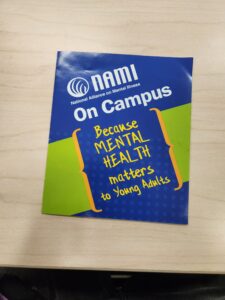From Vol. 90, Ed. 08 May 2, 2024
College is stressful. Classes, clubs, planning for your future and jobs weigh on your shoulders until you cannot stand them anymore. Multiple organizations at WCU are working to bring attention to mental health and offer strategies to combat stress, just in time for finals.
Before COVID, mental health issues were not as common inside colleges as they were after the pandemic.

“The summer of 2021, when we went back face-to-face, rather than 2% or 3% of my classes having these issues, I started to see 25-30% of my students having these issues,” said David Scales, an associate professor in the Department of Psychology.
Because of COVID, college students missed a huge part of their lives, which led to people experiencing mental health and social struggles between the ages of 14 and 18 during the pandemic.
“The social skills one would pick up around 15 or 16 years old from regular social interactions weren’t picked up by college students,” Scales said.
Generation Z started initiatives to help people with mental health issues.
“This is a generation who are far more open to discussing these issues publicly,” Scales said. “They try to get in front of these issues by having some conversations and trying to get people to engage in mutual support.”
WCU offers many resources including Counseling and Psychological Services (CAPS), which offers students free counseling services.
To help students and raise awareness, CAPS started the Be Kind campaign. Multiple white signs were put up around campus that encourage people to take care of themselves in multiple ways.
The signs encourage behaviors such as unclenching your jaw, relaxing your shoulders, drinking water, getting sunlight and even resting. They also have motivational quotes and a wide range of funny sayings.
There are other organizations outside of WCU that students can utilize for mental health resources.
The National Alliance on Mental Illness (NAMI) offers diverse ways to support young adults through their mental illnesses.

Mary Grimes worked as a student intern, participating in work-based learning with NAMI in Wake County before attending WCU.
“They were founded as a grassroots movement by family members with individuals who have experienced mental health concerns,” Mary Grimes said.
NAMI is the largest mental health organization in the country. They “support the unique journey toward mental health and wellness for individuals and families,” according to their pamphlet.
NAMI has done many different studies on mental health. According to their research, the percentage of young adults who report experiencing a major depressive episode or any mental illness has increased every year since 2009.
NAMI aims to help young adults achieve mental wellness. They do this by partnering with the Jed Foundation, another nationwide health service, to make the Mental Health College Guide.
The Mental Health College Guide is a newsletter written by college students to offer advice to fellow students in many different areas.
The guide gives tips on relationships, self-care, self-advocacy, identity, staying safe on a college campus and so much more. It even gives college students resources to turn to when they feel like they need help.
NAMI is available on college campuses through NAMI On Campus. NAMI On Campus are student-led clubs that aim to focus on raising awareness of mental health, educating campus with presentations, advocating for improved mental health policies on campus and supporting people who are going through mental illnesses.






